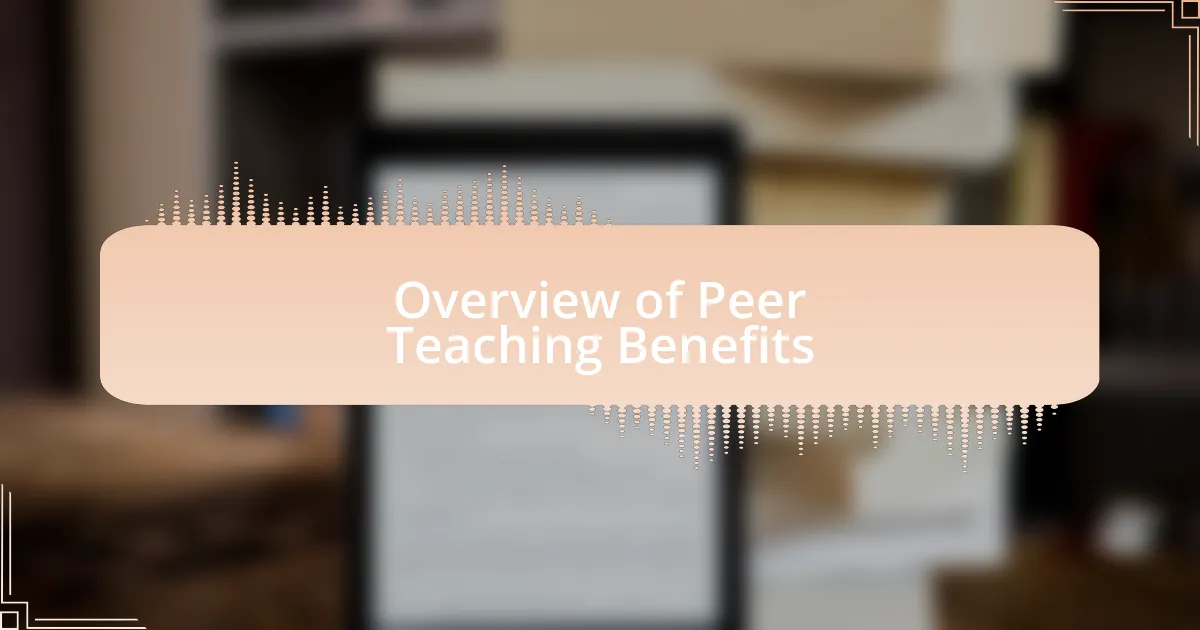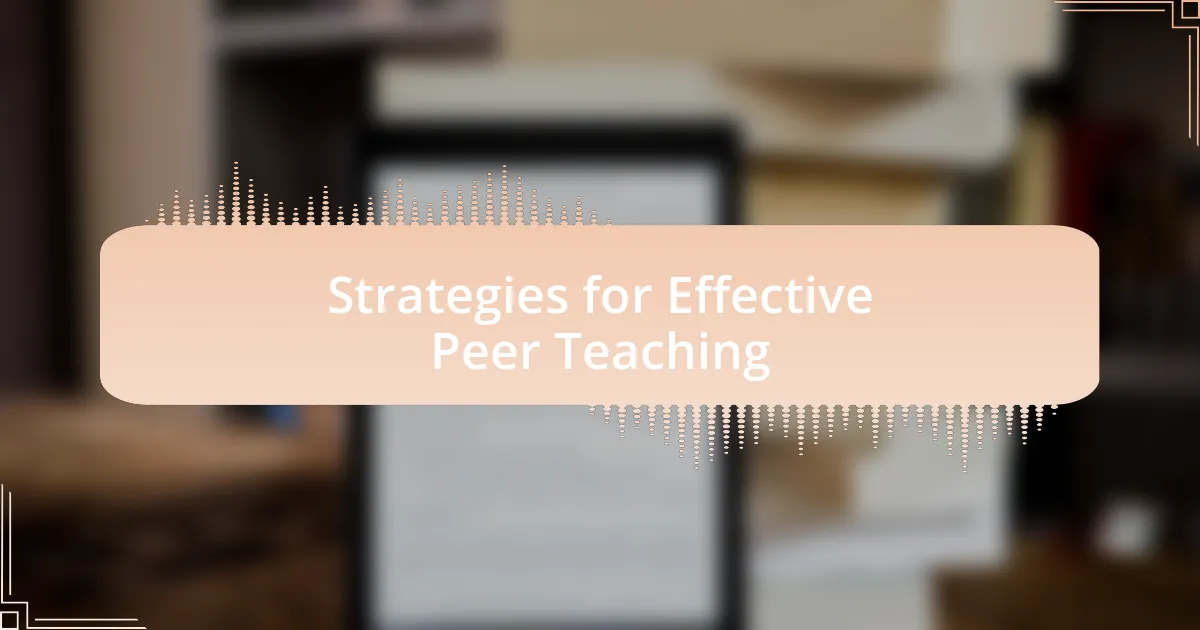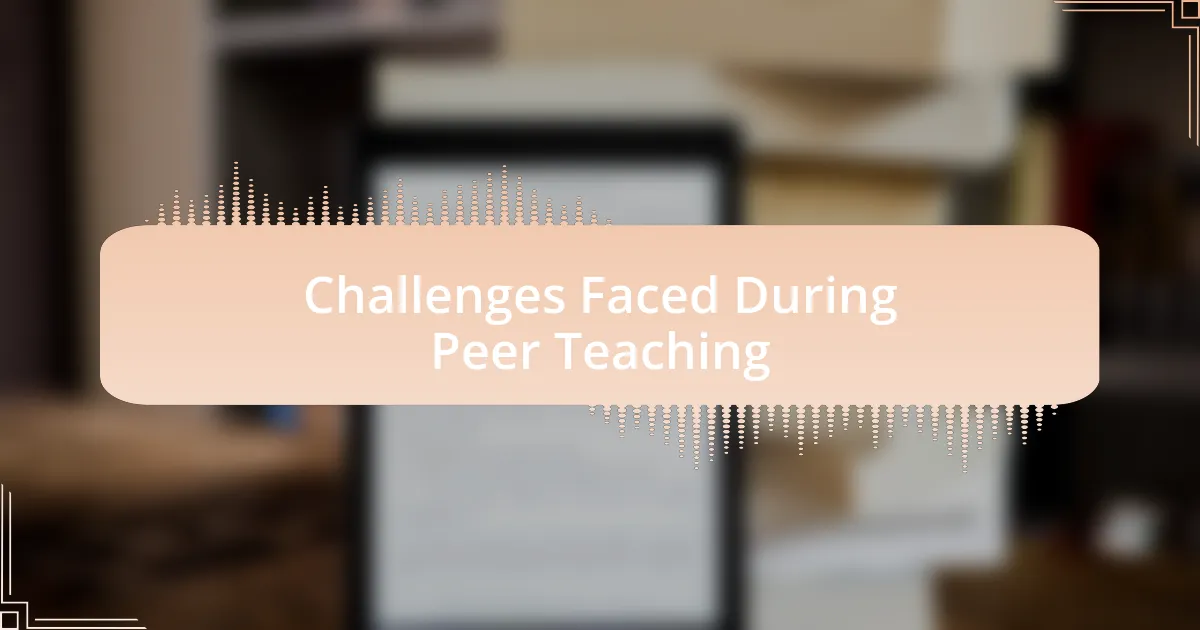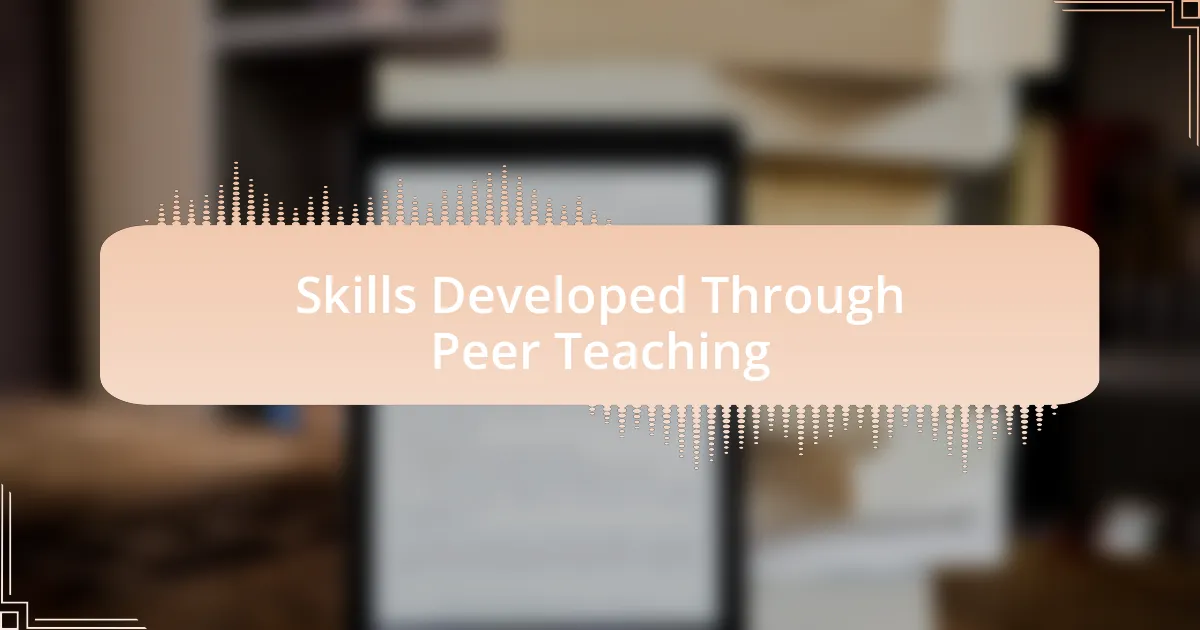Key takeaways:
- Peer teaching fosters community and collaboration, enhancing relationships and reinforcing understanding through teaching.
- Effective strategies include setting clear goals, utilizing diverse teaching methods, and embracing feedback to improve learning experiences.
- Challenges include communication issues, varying levels of preparation, and navigating differing personalities within groups.
- Key skills developed include effective communication, collaboration, and critical thinking, all essential for personal and professional growth.

Overview of Peer Teaching Benefits
Peer teaching can foster a unique sense of community and collaboration among learners. I remember when I participated in a peer teaching session; we didn’t just learn from each other, we built trust and camaraderie. Isn’t it fascinating how sharing knowledge can also strengthen relationships?
One of the most rewarding aspects of peer teaching is the opportunity for deepening understanding. When I explained a complex concept to a fellow student, I realized that I had to truly grasp the material myself first. This experience made me wonder: how often do we overlook our own understanding in the pursuit of grades? Helping others not only reinforces our knowledge but also highlights gaps we might not have known existed.
Additionally, peer teaching encourages the development of critical thinking skills. Engaging in discussions with peers forces us to evaluate our ideas and consider alternative perspectives. I’ve found that when challenged by a peer, I often uncover insights that I might not have reached alone. Have you ever had a moment where someone pushed your thinking further? Those moments can be incredibly transformative.

Strategies for Effective Peer Teaching
One effective strategy for peer teaching is to establish clear goals for each session. I recall a time when my group decided to focus on a specific topic for our session rather than a broad subject. This clarity allowed us to dive deeper into the content, fostering richer discussions and making the learning experience more impactful. Have you ever noticed how having a defined purpose can transform a casual interaction into something meaningful?
Moreover, utilizing diverse teaching methods can cater to varying learning styles among peers. I’ve experienced profound shifts in my understanding when groups integrated visual aids, discussions, and hands-on activities. For instance, incorporating role-playing in a clinical skills session made the principles far more tangible for everyone involved. Isn’t it intriguing how a mix of approaches can appeal to different strengths, enhancing the overall learning process?
Lastly, embracing feedback is crucial in peer teaching. I often found that after a session, discussing what worked and what didn’t led to greater improvement and accountability. This reflection not only builds trust in the group but also enhances our skills as both learners and educators. When was the last time you sought feedback to grow? It’s a simple yet powerful strategy that can elevate the learning experience for everyone involved.

Challenges Faced During Peer Teaching
Working in a peer teaching environment isn’t always smooth sailing. I remember a particular session where my group struggled to communicate effectively. Some members dominated the conversation, while others were silent, leading to frustration and disengagement. It made me question: how can we truly foster a collaborative learning experience if voices aren’t equally heard?
Another challenge that stands out is the varying levels of preparation among peers. I’ve been in situations where one or two individuals came well-prepared, while others seemed to lack the foundational knowledge necessary to contribute meaningfully. This imbalance can create a sense of awkwardness and pressure, leaving some feeling exposed. Isn’t it difficult to thrive in a learning environment when not everyone is on the same page?
Additionally, navigating differing personalities in a group can be quite tricky. There are times when I’ve encountered strong opinions that clashed, leading to tension rather than productive dialogue. I found that a lack of conflict resolution strategies left us at a standstill. How do you address disagreements constructively to keep the focus on learning? It often requires patience and a reminder of our shared purpose, but it’s a learning curve that can enrich our peer teaching experiences if handled correctly.

Skills Developed Through Peer Teaching
One of the most significant skills I developed through peer teaching is effective communication. I still recall a session where I had to translate complex concepts into simpler terms for my peers. This experience taught me not only how to articulate my thoughts clearly but also to listen actively. Have you ever noticed how challenging it can be to strike that balance between speaking and listening? It’s a skill that has transcended the classroom, helping me connect better with patients and colleagues alike.
Collaboration was another skill that flourished in this environment. There were moments when I had to work closely with peers who had diverse perspectives and learning styles. I vividly remember brainstorming solutions to a case study where our differing insights led to a richer discussion. This taught me that the best outcomes often arise from collaborative problem-solving. Why is it, then, that so many of us hesitate to embrace such diversity in thought? Learning to appreciate these differences can truly enhance our overall learning experience.
Lastly, I sharpened my critical thinking abilities during peer teaching. I faced situations where I had to not only absorb feedback from my peers but also provide constructive criticism. I remember providing feedback on a presentation that didn’t fully grasp the clinical nuances. Instead of just pointing out flaws, I aimed to suggest alternatives, which reinforced my own understanding. This back-and-forth refined my analytical skills and helped me understand the importance of being both a learner and a teacher. How do we truly grow if we don’t engage in this kind of reflective dialogue? It’s a reciprocal process that enriches both sides.